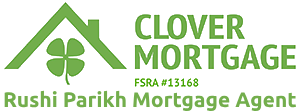Residential Mortgage Broker in Mississauga – Three Types of Home Loans
You may come across various kinds of home loans, such as uninsured, insurable, and insured mortgages when researching their interest rates. Approaching a residential mortgage broker in Mississauga, such as Rushi Parikh (Clover Mortgages), and knowing the key differences between these three types of home loans is extremely critical since your decision is going to affect the interest rates offered by the lenders.
Insured Mortgages
Lenders typically provide insured mortgages to borrowers who are planning to make a down payment of one-fifth of the purchase price of their property or even less. These home loans have a loan-to-value ratio between eighty percent and ninety-five percent, which does make them high-ratio mortgages.
Note that federal law requires financial institutions to default-insure these home loans in collaboration with any of the three major insurers, namely, Canada Guaranty, Sagen, and Canada Mortgage and Housing Corporation (CMHC). The cost of insurance is usually included in the quantum of the loan provided to you by the lender and not paid up-front.
However, some provinces charge tax on the insurance amount, payable at the time of closing your mortgage. Insured mortgages generally offer the lowest rates because the insurance provider takes on the loan default risk in place of your lender.
Insured mortgages are subject to a few restrictions, such as no provision for refinancing, non-availability if the property happens to fall under the non-owner occupied category (investment or rental homes), and most importantly, the maximum market value of the property in question must not exceed one million dollars.
Furthermore, it should be located in Canada and the maximum amortization period for the same would be twenty-five years. In addition, standard debt qualification ratios as well as the mortgage stress test are going to apply as well. (TIP: You may consider getting in touch with a residential mortgage broker in Mississauga to learn more about them.)
Insurable Mortgages
Insurable mortgages are similar to insured mortgages, except the borrower does not pay the insurance premium. Lenders insure these mortgages through back-end bulk insurance. This allows them to offer lower interest rates albeit typically not as competitive as they are in the case of insured mortgages. However, this does not apply when your loan-to-value ratio amounts to lower than sixty-five percent.
Insurable mortgages are comparatively less risky than insured ones since the former meet specific eligibility requirements stipulated by the insurer, such as the credit score of prospective borrowers and the loan-to-value ratio.
However, similar to the latter, some restrictions apply to insurable mortgages too; including no option of refinancing (you may obtain one when transferring or switching), available exclusively for mortgages with a loan-to-value ratio of eighty percent or lower, and most importantly, the maximum market value of the property in question must not exceed one million dollars.
Moreover, the property should be a small rental home of four to two units or owner-occupied and the amortization period for the same would be twenty-five years. Standard debt qualification ratios and the mortgage stress test are applicable as well.
Uninsured Mortgages
Uninsured mortgages are loans that do not come with a guarantee from private insurers or the federal government. They essentially refer to home loans that do not meet the guidelines for insurable or insured mortgages. This means that the lender takes on all the risk in the event of default by a borrower, which usually makes the interest rates of uninsured mortgages the highest of these three types of home loans.
Refinances also come under uninsured mortgages since they are never insured. A few of their key attributes are the liberty to include a single-unit rental home, the choice of having an amortization period of over twenty-five years, and most importantly, the property in question is not subject to any restrictions whatsoever concerning their purchase price.
When you secure an uninsured mortgage from a non-federally regulated financial institution, such as certain credit unions and private lenders, you will not have to undergo the otherwise mandatory mortgage stress test, which is arguably the most significant advantage of home loans like these.
Call us now to schedule a no-obligation consultation at your convenience with a residential mortgage broker in Mississauga!
